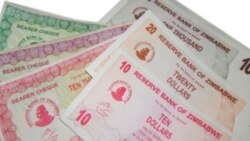A lot has been said about the proposed introduction of bond notes in Zimbabwe with some critics saying this is set to cripple the economy.
Central bank governor John Mangudya has been a bit hazy on this issue with indications that he is backtracking on some of the intended functions of the bond notes. He says they are not supposed to ease cash shortages but to promote exports in an under-performing economy.
Despite some of the contradictions that have emerged over the bond notes, politics remains key in the implementation of monetary policies in most countries, save for a few where central banks are independent.
What is the impact of politics in economic activities in countries like Zimbabwe? Is it possible to remove politicians from the economic equation or use them to fix the underlying economic problems in Zimbabwe?
For perspective, Studio 7 reached Zanu PF UK-chairman Nick Mangwana and economist Prosper Chitambara of the Labour and Economic Development Research Institute of Zimbabwe.
Mangwana said the central bank depends on politicians in crafting and implementing monetary policies and as a result cannot be dumped in attempts to revive the economy.
“The Reserve Bank of Zimbabwe is a national institution which is under the Ministry of Finance … It has to account to parliament and that is why he (John Mangudya who appeared before a parliamentary committee to clear the air over bond notes) came to parliament. And the idea of avoiding the involvement of politicians was actually attempted because that is the reason why the minister didn’t present this particular monetary policy or effort to parliament but the governor himself.
“I am saying that is the effort to remove the politics out of it and focus on the policy itself.”
Chitambara concurred, noting that “you can’t get rid of politicians in the economic equation because what politicians then do is to provide what we call a vision. They are actually supposed to enunciate the vision then the technical guys are the ones that run with the vision … They implement the vision.
“So, we need politicians to guide us in terms of the direction, in terms of the vision and then we the technical people will run with that vision. So, you can’t really separate the two …”
Mangwana further noted that Zanu PF was not directly involved in these economic policy issues as its appointed point man, Finance Minister Patrick Chinamasa is in charge of the Ministry of Finance and Economic Development.
According to Chitambara, politicians and Treasury officials are expected to work hand in hand with all stakeholders in implementing sound economic policies in Zimbabwe.
“I think what Zimbabwe needs today is a social contract that brings together government, business, labor and communities to actually reach a consensus on what actually needs to be done and to address the key binding constraints that are militating against efforts of government to achieve sustainable development.”
Zimbabwe’s economy is this year expected to grow by only at least 1.5 percent due to lack of foreign direct investment, inconsistent policies and other issues.






